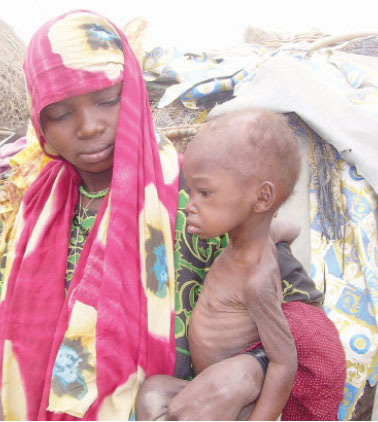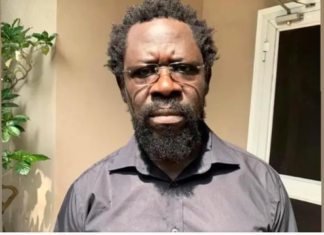The recent alarm raised by UNICEF and the Senate president about hunger in the children IDP camps in Borno State deserves emergency attention, writes SAM NWOKORO
Perhaps, it is only the outcry over the abduction of over 200 school girls from Government Secondary School in Chibok, Borno State, in 2014 that comes close in seriousness to the current concern over the plight of children in the camps of Internally Displaced Persons (IDPs) in the Boko Haram-ravaged areas in the North East part of the country.
Since the tempo of the Boko Haram attacks decelerated in the past few months, the distribution of needs, especially food, is slowing.
Although various kinds of items have been given, the number of displaced people keeps increasing by the day, as the insurgents create new displacements, even in its ‘degraded’ state.
Perhaps, it is in response to sundry calls from first-hand witnesses of current plight of IDPs that jolted the United Nations Children’s Fund (UNICEF), the agency in charge of children’s welfare worldwide, to a fact-finding tour of some of the IDP camps.
UNICEF Regional Director for West and Central Africa, Manuel Fontaine, was so shocked that he had to go meet with Nigeria’s Senate president, Bukola Saraki, to lay the worrisome complaint.
According to Fontaine, about a quarter of a million children in Borno, North East Nigeria, are suffering from severe malnutrition. Of the number, about one in five will die if they do not receive treatment, he added.
As Boko Haram is pushed out and more of the North East area is becoming accessible to humanitarian assistance, UNICEF said, the extent of the nutrition crisis is becoming more apparent.
“Some 134 children on average will die every day from causes linked to acute malnutrition, if the response is not scaled up quickly,” said Fontaine, who just returned from a visit to Borno.
“We and all partners and donors are to step forward to prevent any more children from dying. No one can take on a crisis of this scale alone.”
The former UN child protection adviser said ruins of towns accommodating displaced people, families with little access to adequate sanitation, water or food, and thousands of frail children are in desperate need of help.
“There are two million people we are still not able to reach in Borno State, which means that the true scope of this crisis has yet to be revealed to the world,” he stressed.
The situation in the Lake Chad Basin overall has been the subject of discussions at regional dialogues and at the UN Headquarters. Around 3.8 million people are currently facing severe food insecurity across the basin, where the lean season has now set in in many parts.
Early this year, UNICEF appealed for $55.5 million to respond to the humanitarian crisis in the North East, but has so far only received $23 million, the equivalent of 41 per cent.
Similarly, Senator Saraki, pricked by such inauspicious courtesy visit, raised the alarm that malnutrition is afflicting one in five children in Borno, warning that if nothing is done to reverse the humanitarian crisis caused by the Boko Haram insurgency, 134 children could die every day from starvation.
His concern only corroborates the concern contained in a statement issued by the UN Centre, which said about 250,000 children in Borno were suffering from acute malnutrition.
Saraki, who was in Maiduguri, the Borno State capital, for a condolence visit to the people of the state over the death of the First Republic minister and first African Head of the Organisation of Petroleum Exporting Countries (OPEC), Shettima Monguno, also took time out to visit the Centre for the treatment of people suffering from severe malnutrition.
Speaking to journalists at the Maiduguri International Airport after his visit to the Centre for the victims of acute malnutrition, Saraki lamented that Borno had been left to carry too much of the burden of the Boko Haram insurgency, adding that it had become pertinent for others to lend a hand.
He said: “I am happy I’m here with the leader of the Senate (Mohammed Ali Ndume). Before we (proceed on) break, we will definitely discuss it (Borno IDP malnutrition crisis) on the floor and see what we can do.
“The federal government and all agencies need to step up to the plate. I think it is not good for a country like ours; we are a rich country.
“It is just an issue of organising ourselves and getting the funds to support the state government. The state has been carrying too much of the load on its own.”
He appealed that the state government should be assisted by the federal government, the private sector and wealthy individuals all over the country.
“We all need to put in our efforts and see how we can address the situation because it is the women and children that have suffered the most from this. We must do our best to play a role and support the state in doing that,” Saraki added.
Accompanied on the visit by Senators Ndume, Abubakar Kyari (Borno North), Baba Garbai (Borno Central) and Adamu Aliero (Kebbi Central), Saraki said the visit to Borno was very important, as it offered the team the opportunity to see, first hand, the extent of the crisis.
He said: “It is clear that the state government has done very well. The report we heard was about some of the children not being able to walk because of malnutrition. We can see all of them now well-nourished. I must commend the efforts of the state government in doing that.”
He however added that the visit also confirmed that there was still a lot of work ahead.
On how the Senate would assist in the rehabilitation, reconstruction and resettlement of the people and communities affected by the Boko Haram crisis, he said: “We are almost at the final stage of passing the law on the North East Development Commission. We believe that the institutional framework is necessary to start to address the situation, and once we pass the bill, the commission can start to work and begin to handle rehabilitation and reconstruction that is important.”
UNICEF said that as Boko Haram is pushed out and more of the North East area becomes accessible to humanitarian assistance, the extent of the nutrition crisis was becoming more apparent.
Refugee crisis as diplomatic issue
The issue of refugee crises in global politics has been of immense consideration for the UN. It factors in a country’s handling of refugee crisis when judging the human rights credentials of any nation. For a country like Nigeria under Buhari currently being pummelled on various fronts, the treatment of refuges in the Boko Haram-ravaged areas will go a long way in spurring other nations to help in post-Boko Haram reconstruction efforts. Already, various friendly nations had made several pledges to help Nigeria in this area. The U.S. recently donated $2.3 billion for the reconstruction of the North East.
A swift and effective response to the case of the IDPs in the North East via Saraki’s moves is capable of toning down the current face-off between Saraki and President Muhammadu Buhari.
“I believe the absence of the proper structure to coordinate the state donations, international donations, and those from individuals is also hampering progress. So all the load is placed on the state government. But if there is an institution that is mandated to do that, then it knows it has a responsibility.
“We are very keen to get this done. We are at the last stage now, and we want the commission to start work soonest,” the Senate president pledged.












